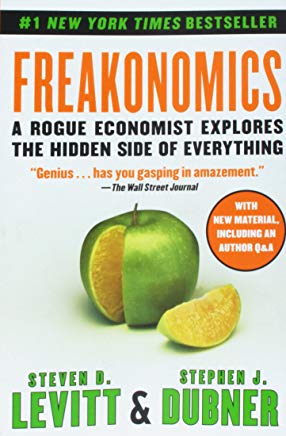
This article is an excerpt from the Shortform summary of "Freakonomics" by Steven Levitt and Stephen Dubner. Shortform has the world's best summaries of books you should be reading.
Like this article? Sign up for a free trial here .
Freakonomics: A Rogue Economist Explores the Hidden Side of Everything applies the tools of economics to explain real-world phenomena that are not conventionally thought of as “economic.”
Authored by Steven D. Levitt and Stephen J. Dubner, Freakonomics argues that data analysis and incentives can explain a lot about human behavior, and that a great deal of what experts and conventional wisdom tell us is wrong. As they explore these themes, the authors give us some powerful—and highly counterintuitive—insights into why the world is the way it is.
Freakonomics Introduction: Peeling Back Conventional Wisdom
Are we right to accept the opinions and recommendations of experts? Are there perhaps deeper mechanisms at work that might explain why human beings behave the way they do and why events unfold as they do? In fact, much of the conventional wisdom we have come to accept is false.
The Missing Crime Wave of the 1990s
As the decade of the 1990s dawned, the US airwaves were awash with experts claiming that a new crime wave (far more terrifying than the just-passed crime wave of the 1980s) was on the horizon, to be driven by a fresh cohort of violent, amoral young “superpredators,” who would soon be entering the prime years of their criminal careers.
Except that the crime wave just…never happened. In fact, a historic drop in crime would be a hallmark of the period beginning in the 1990s and lasting through to the present day. In a later chapter, we’ll discuss how data and analysis were used to unpack this misconception…
Freakonomics Chapter 1: The Power of Incentives
Economics is the Study of Incentives
There are three main kinds of incentives:
Economic Incentives
This is the type we’re most familiar with. Economic incentives provide tangible rewards to people for engaging in productive behavior and penalties on people for destructive behavior. Getting a raise at work for exceeding expectations, a speeding ticket, or even being sentenced to prison (which deprives one of one’s freedom and livelihood), are all economic incentives.
Social Incentives
Social incentives are rooted in our natural desire to be looked upon favorably by others. On the flip side, we fear being shamed and looked upon disfavorably by our peers. To harness social incentives, many jurisdictions in the US have started publishing the names and photos of people arrested for prostitution-related offences—likely a far stronger deterrent than a $500 fine…
Freakonomics Chapter 2: Information Asymmetry
Unequal Access to Information
As the world has become more specialized and complex, people have come to rely more and more on experts to guide them through major life decisions. This is largely driven by fear of making a wrong decision that might result in financial ruin or even physical harm.
As we’ve discussed above, however, experts are hardly neutral arbiters of truth who are selflessly devoted to guiding you through the trials and tribulations of a staggeringly complex world. Rather, they are often self-interested, equally fallible humans who seek to use their superior information to gain an advantage on you. This unequal distribution of information between parties to a transaction is known as information asymmetry.
Think of the mechanic who tells you that you need to replace parts of your engine that you’ve never heard of to be able to pass your vehicle inspection. Or the doctor who orders that MRI that you’re not quite sure you needed. Or the car salesperson who insists that you need all of those pricey add-on safety features. All of these experts know perfectly well that you know nothing about their business. Often, your information deficit is their gain, especially if they have strong incentives to profit.
Freakonomics Chapter 3: Trust the Data
The Trouble with Conventional Wisdom
Experts are major purveyors of conventional wisdom. Conventional wisdom comprises those beliefs or ideas that are commonly accepted, regardless of their truth or predictive value. It is an impediment to actual knowledge and discovery, often motivated by a mix of self-interest, convenience, and a desire to avoid dealing with the actual complexity of the world. Conventional wisdom is often anecdotal and is rarely backed up by hard, quantitative data.
The Myth of the “Crack Millionaires”
Let’s set the stage. The 1980’s were marked by a tide of rising crime in The United States. A great deal of the violence in the inner cities was driven by crack-cocaine. According to one study, crack accounted for a shocking 25 percent of homicides in New York City in 1988.
It was in this context that the conventional wisdom of “crack millionaires” was born. The myth was largely propagated by police officers, criminologists, and others in the law enforcement community. They argued that dealers were making money hand-over-fist and living extravagant, luxurious lifestyles. Furthermore, these experts warned, the profits from crack dealing were enabling the gangs to purchase state-of-the-art weaponry that left police officers outgunned…
Freakonomics Chapter 4: Big Effects Can Have Small Causes
(Shortform note: this chapter discusses the dramatic and unexpected fall in US crime rates beginning in the early 1990s, examining a number of popular theories for why this happened before proposing an alternative, and quite counterintuitive, explanation. As we’ll discuss later, the authors’ theory has become controversial since the initial publication of Freakonomics.)
The Rise and Fall of Crime
We discussed the crack-fueled violence of the 1980s in the preceding chapter. But crack was just one part of an alarming rise in violent crime that had begun in the 1950s and continued for a generation. In 1989, violent crime in America was at a peak, having risen 15 percent since 1975.
Criminologists and law enforcement personnel warned the public that these trends would continue well into the 1990s and beyond. But this also proved to be wrong. Beginning in the mid-1990s, crime began an unexpected and precipitous decline, dropping to levels not seen since the 1950s. The much-predicted (and much-feared) rise in murders, rapes, burglaries, and assaults simply failed to materialize.
Freakonomics Chapter 5: Correlation vs. Causation
Why We Falsely Link Effects to Causes
When two things happen together, it’s tempting to believe that one caused the other. For example, in the previous chapter, we saw that the economy improved while crime rates dropped. This seems like a satisfying explanation, until the data show the economy couldn’t have had a large effect.
In reality, many correlated phenomena are correlated purely by chance. This gives rise to the well-known saying, “correlation does not imply causation.”
(Shortform note: this underlies a lot of popular superstitions, like people who wear their “lucky hats” to baseball games because they think it helps their team win.)
How Parents Fall Prey to the Correlation vs. Causation Trap
A great demonstration of the correlation/causation trap can be found in the proliferation of popular theories about how “best” to raise children. For years, childcare experts have advocated contradictory and ever-changing theories:
Freakonomics Chapter 6: What Data Can Teach Us
(Shortform note: this chapter is meant to illustrate what we can learn from applying statistical tools like regression analysis to a rich and large dataset. Like other chapters in Freakonomics, it employs an unusual, counterintuitive, and decidedly non-economic story—in this case, the effect on life outcomes of individuals with black-sounding names—as a framing device for economic principles. When reading the book, it can be easy to get lost in the minutiae of the individual stories, so we reinforce the larger, overarching ideas.)
Natural Experiments and Economics
Economics is not an easy field in which to conduct randomized controlled experiments. Since much of economics focuses on quantities that are very large (national GDP, effects of fiscal policy on employment) and involves the study of individual decisions made by billions of people, it’s rare for economists to be able to test their hypotheses in a lab.
Freakonomics Epilogue: Articles and Supplemental Material
(Shortform note: This section is composed of a series of articles from the New York Times Magazine, including a “Freakonomics” column that ran in the magazine from 2005-2006, as well as select entries from the “Freakonomics” blog that were added to the revised and expanded 2006 edition to the book. These should be viewed as supplemental readings only. They aren’t necessary for understanding the larger themes of the main Freaknomics text, and many of them simply restate or summarize the case studies featured in the original book.
From these articles, you should gain a deeper understanding of why the author’s focus on the stories that they do, how they define their approach to economics, what they think are the main drivers of behavior (incentives), and how data analysis can provide powerful insights into how the world actually works.)
“The Probability that a Real-Estate Agent is Cheating You (and Other Riddles of Modern Life): Inside the Curious Mind of the Heralded Young Economist Steven Levitt” (2003)
This article discusses Levitt’s focus on applying an economic lens and economic tools to explain events and behaviors that are traditionally outside the realm of economics.
His approach has been to take the “dismal” out of the “dismal science” of economics by blending psychology, neurology, criminology, and other fields into the discipline, engaging a wider audience and using economic theories and methods of analysis to provide insight to pressing real-world problems. Fundamentally, Levitt defines his approach to economics as empiricism (knowledge through observation) over theory.
———End of Preview———

Like what you just read? Read the rest of the world's best summary of "Freakonomics" at Shortform c . Learn the book's critical concepts in 20 minutes or less .
Here's what you'll find in our full Freakonomics summary :
- How every single person behaves according to incentives
- Why you should tune out experts and make your own decisions
- The surprising truth behind why crime declined so much in the 1990s






